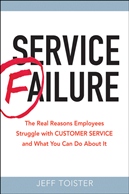The service power of fully engaged employees
 Jeff Toister
Jeff Toister  Friday, August 12, 2011 at 7:47AM |
Friday, August 12, 2011 at 7:47AM | My wife, Sally, and I recently spent a few days relaxing at a resort hotel in Phoenix. One of our best customer service experiences came from an unlikely source: an associate named Darryl who was doing construction work to help renovate some of the hotel's rooms.
Businesses often focus customer service initiatives on employees whose customer service role is obvious. At a hotel that might be a front desk agent, bellman, or valet. However, anyone who comes into contact with your customers, whether directly or indirectly, is in the service business. Darryl was a great example of how one person can make a big difference.
 We ran into Darryl while walking through the hotel. He greeted us with a warm smile and asked us if he could help us find anything. When we told him we were touring the hotel, Darryl told us about some of the renovations they were working on. He spoke with obvious pride about how the hotel was working to make itself even better.
We ran into Darryl while walking through the hotel. He greeted us with a warm smile and asked us if he could help us find anything. When we told him we were touring the hotel, Darryl told us about some of the renovations they were working on. He spoke with obvious pride about how the hotel was working to make itself even better.
Darryl then asked us if we were enjoying our stay. We told him we were, especially the time spent lounging by the pool. Darryl gave us a few tips on which pools were best at different times of the day.
Finally, Darryl asked if there was anything he could do to make our stay more enjoyable. We told him no, but Darryl encouraged us to let him or another hotel associate know if there was anything we needed.
Darryl created a positive experience for us because he knew he was in the service business. Do all of your employees know they are in the service business, even if "service" isn't in their title? Are they fully engaged with your organization? Try to imagine what you could achieve if you had more Darryls!



